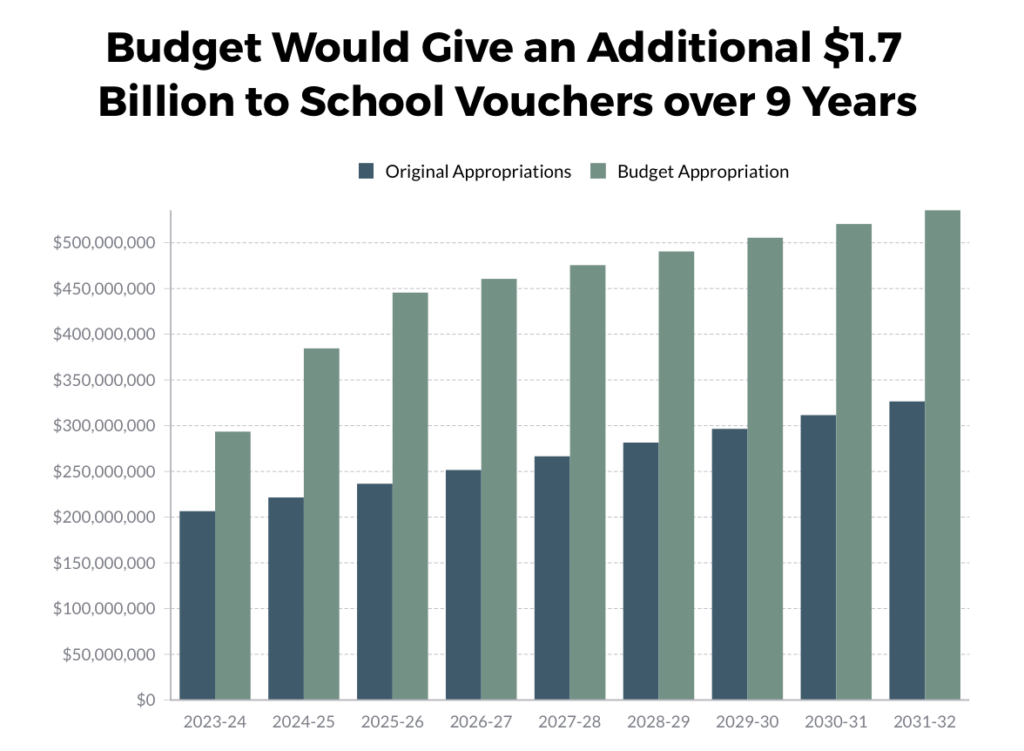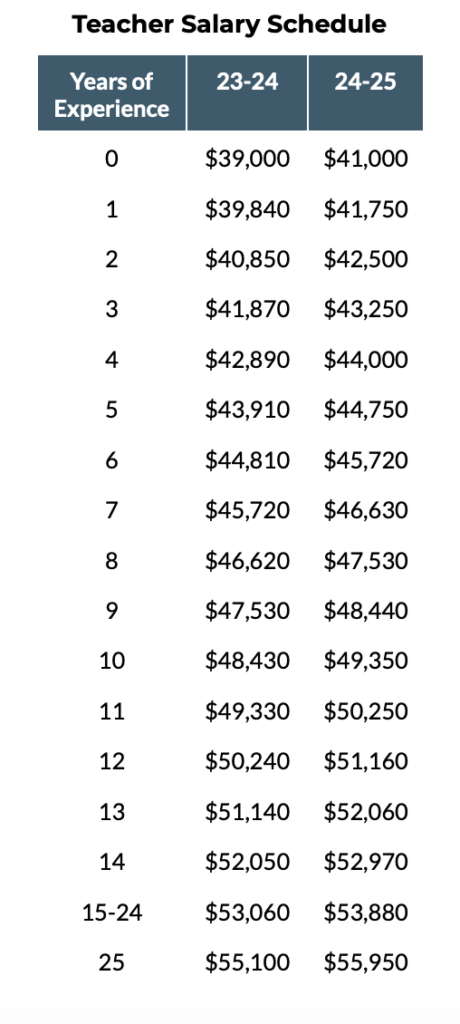BUDGET STATUS: At time of publishing, the 2023 North Carolina state budget has passed both chambers of the NCGA, and the Governor has stated that he will allow the budget to become law without his signature. See how your legislators voted here.
Over 1.4 million students across North Carolina attend our public schools, and public schools serve as the hub of our rural, suburban, and urban communities. North Carolina law outlines that it is the state’s responsibility to fund public school operations. Budgets are a reflection of values and priorities, and the conference budget developed by the NC General Assembly does not address the needs of North Carolina’s students. This budget accelerates tax cuts benefiting businesses and the wealthy, taxpayer dollars going to unaccountable private schools, and the overall disinvestment in public school students and educators. This budget also includes a number of provisions that will further limit the ability of the public to engage in the democratic process and will make efforts to reverse harmful policies much more difficult.
North Carolinians who value and rely on public schools are experiencing the cumulative impact of our state leaders’ actions every day. Students returned to school this year with many teacher vacancies and a growing number of classes taught by unlicensed educators. Some schools have had to close due to outdated, unsafe school facilities. Highly-qualified teachers are being forced to leave due to their inability to afford basic living expenses and untenable working conditions. Students across the state are arriving to school late due to bus driver shortages. Our students, educators, and communities need and deserve better.
Vouchers
The conference budget sets forth a dramatic expansion of the Opportunity Scholarship voucher program. This budget will eliminate income requirements to receive vouchers, making all students, including those from wealthy families and those who are already attending private schools, eligible to receive public funds to subsidize tuition at private schools. Scholarship amounts will also increase, and students will now be able to receive up to 100% of the average state-allotted ADM funding to apply towards private school costs.
The budget significantly increases funding for vouchers to account for this expansion. For the current biennium, funding for the program increases to over $678 million (approximately $293.5 million in 23-24 and $384.5 million in 24-25), compared to the $428 million in appropriations outlined in the 2021 budget. If this funding were instead allocated to public schools, the budget could more than double teacher raises for the biennium. By 2029, over $500 million annually in taxpayer dollars will be allocated to private schools.

North Carolina’s conference budget fails to enact meaningful requirements to hold private schools receiving voucher funds accountable to families and taxpayers. Private schools receiving public dollars are subject to very little financial oversight, and the budget adds no additional requirements to improve financial accountability and transparency with expansion of the program. While the budget includes a new requirement for all scholarship recipients in grades 3, 5, and 11 to take the same standardized test, only schools enrolling more than 25 students in a grade would be required to publicly report student performance data. Based on current figures, fewer than 3 percent of voucher-receiving private schools would be subject to this requirement.
The budget also adds a new provision for students not receiving the full scholarship amount. Beginning in the 25-26 school year, the General Assembly will send leftover funds back to the public school if a student transfers from the public school to a private school, makes use of a voucher, and does not qualify for the full scholarship amount. However, the provision is vague and fails to define an actual process for this reallocation beyond the “intent” of the General Assembly. Developing a transparent and seamless process to ensure districts receive this funding will be an important part of implementation.
Other unexpended funding will be allocated for parental outreach and application assistance, doubling the current amount to up to $1 million annually. Parents for Educational Freedom in NC currently holds this contract.
Educator Compensation
Teachers are the number one school-related factor that influences student outcomes, and the teaching profession is in a state of crisis. Including both K-12 instructional and EC positions, NC had approximately 3,500 vacant teaching positions this fall and many more positions filled by teachers that are not fully licensed. To help combat this trend, The Forum has long advocated for fair and competitive compensation for educators, including reinstating master’s pay and raising salaries across the board by 24.5% to reach the national average.
The raises included in the General Assembly’s budget are less than one third of what the Forum called for (an average 7% increase over the biennium according to budget writers – other estimates are closer to 6.5%), and do not include reinstating master’s pay. Increases are higher for beginning teachers. Starting teacher pay will increase from $37,000 to $39,000 in the first year of the biennium and to $41,000 in the second, which means that North Carolina will continue to fall behind neighboring states and the national average. South Carolina, for example, has increased starting pay to a minimum of $42,500, while beginning teachers in Alabama make over $43,000. Veteran teachers, with raises as low as 3.6% over the biennium, will continue to have their salaries frozen between years 15-24 of experience. These teachers will see an increase of only $106 per month in 2023-24. Persistently low teacher pay in North Carolina will continue to negatively impact teachers’ livelihood and morale, as other states and other professions grow increasingly more attractive.

The 2023-2025 state budget also includes:
● A 7% raise over the biennium for non-certified employees.
-Bus drivers will receive this raise, plus a 2% additional raise.
● A 7.5% increase in starting pay over the biennium for principals.
● Salary supplements for school nurses, psychologists, and counselors.
● A program to administer signing bonuses for teachers in qualifying small/low-wealth counties of up to $1,000 in state matching funds.
Educator Recruitment, Retention and Diversity
Aside from increasing educator salaries, other bold steps are needed to attract and retain a diverse group of educators. This budget includes a few efforts to strengthen the teacher pipeline, including expansion of the NC Teaching Fellows Program to include 10 institutions (it currently includes 8) and K-6 teachers (it currently includes only STEM and special education teachers). The scholarship amount is slightly increased (from $4,125 to $5,000 per semester). The Public School Forum recommended the expansion of this program to include all UNC system schools and all subject areas (which was proposed in the Governor’s and House budget). Pathways for growth in the teaching profession are critical to retaining our educators. We were pleased to see the creation of a grant program to reimburse teachers for participation fees in the National Board Certified Teacher certification process. The program gives priority to teachers in low-performing schools, or schools where at least 10% of students are identified as at-risk. Funds to expand Advanced Teaching Roles and provide salary supplements were also included.
The budget includes initial funding for two new alternative programs to recruit and train teachers:
● Teacher Assistant Tuition Reimbursement Program: Provides up to $4,600 per year for up
to four academic years to current Teacher Assistants as they pursue a college degree that
will result in teacher licensure.
● Teacher Apprentice Grant Program: Provides grants to Local Education Agencies to award
funds for the cost of tuition.
Mental Health and School Safety
The budget increases appropriations for school safety grants by $70 million over the biennium, and adds,120 new school health personnel positions to be allocated to districts based on student enrollment numbers. The budget also provides more flexibility for districts by creating a new school health personnel allotment to include school psychologists, counselors, nurses, and social workers. Districts can also use funding provided for this allotment to contract with a third party to provide equivalent services if necessary. The budget also eliminates penalties for unpaid student meal debt and eliminates copays for reduced-price meals.
Parents’ Bill of Rights
North Carolina Session Law 2023-106, most commonly known as Parents’ Bill of Rights, has left districts with more questions than guidance. The new budget changes the timeline of implementation and required reporting, and provides clarity around certain situations on whether parental notification and/or parental consent is necessary.
Timeline for Implementation
●The ‘in effect’ date has been delayed 4 months from August 16, 2023 to January 1, 2024.
● Required reporting by districts has been pushed back one year from September 15, 2023 to
September 15, 2024.
● Required reporting by the State Board of Education has been pushed back one year from
November 15, 2023 to November 15, 2024.
Parental Consent and Notification
● Parents must be notified, but will not need to consent, in order for their child to use a
different name or pronoun from what is listed on official school documentation.
● Parents will not need to be notified or provide consent when school personnel act in a
medical emergency.
Leandro Comprehensive Remedial Plan
The budget falls far short of funding the court-ordered, evidence-based Leandro Comprehensive Remedial Plan that outlines a set of requirements for the state to meet its constitutional obligation to provide a sound basic education to all students. Just 7% of the plan will be funded in 2023-24 and 4% in 2024-25.
Access to and Fairness in the Democratic Process
The budget also includes a number of provisions which could further erode the balance of power in state government and will limit the public’s access to information and participation in the democratic process. The budget implements the following changes:
● Adds broad language that would allow lawmakers to refuse to comply with the state’s
Public Records Act, which could significantly limit public transparency in the legislative
process. The budget states that “A legislator, while in office or after leaving office, shall not
be required to reveal or to consent to reveal any document, supporting document, drafting
request, or information request made or received by that legislator while a legislator.”
● Strips additional power from the State Board of Education by restricting their ability to
withhold or reduce funding for charter schools that are approved by the new Charter
School Review Board.
● Raises the retirement age on the State Supreme Court and the Court of Appeals from 72 to
76, which would allow Supreme Court Chief Justice Paul Newby to finish his current term.
● Transfers appointments for the Judicial Standards Commission to the General Assembly.
● Eliminates the automatic right to appeal to the NC Supreme Court in the case of a split
decision in the Court of Appeals.
● Appropriates $2.7 million to implement new voter ID requirements.
Click here for additional budget details and comparisons between the final budget and proposals by the Governor, House, and Senate. See the full budget bill here and the money report here.
Correction: A previous version stated that Parents for Educational Freedom has funded campaign contributions for Republican members in the General Assembly, which is incorrect. PEFNC is a 501(c)3 nonprofit and does not and cannot make campaign contributions. PEFNC’s 501(c)4 partner organization, Partners for Educational Freedom, which shares its office, staff, and board members with PEFNC, manages a political action committee that has made campaign contributions to Republican members in the General Assembly.

Leave a Reply